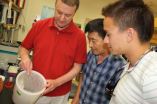(Press-News.org) In a new study with implications for state and federal efforts to reform payments to doctors and hospitals to encourage greater coordination of care, Harvard Medical School researchers found that a global payment system underway in Massachusetts lowered medical spending while improving the quality of patient care relative to the traditional fee-for-service system.
The study, published today in the New England Journal of Medicine, examined the Alternative Quality Contract (AQC), which was first introduced by Blue Cross Blue Shield of Massachusetts (BCBSMA) in 2009 and now includes more than a third of the insurer's provider network.
Among the study's findings:
The medical spending was nearly 2% lower among physicians and hospitals participating in the AQC compared with those working under traditional fee-for-service contracts.
Importantly, for physicians and hospitals with no previous experience in a global payment model, spending was 6% lower than that of providers in traditional fee-for-service contracts.
These year-one savings were largely the result of physicians changing referral patterns and shifting care to lower-cost facilities
By the end of year-1, quality of care among AQC providers was significantly higher than that of non-AQC providers in the BCBSMA network, especially for adults with chronic illness and for children.
Because the AQC contract shared savings with providers, rewarded providers for quality and, in some cases, include provider support for infrastructure development, the total dollars paid to AQC groups in the first year likely exceeded the savings achieved through reduced medical spending.
This outcome reflects the design of the AQC, which focuses on slowing the growth of spending and improving quality initially, rather than saving money in the first year.
"The finding of reduced spending, together with improved quality in year-one of the contract is significant," says senior author Dr. Michael Chernew, Harvard Medical School. "For policymakers contemplating improved payment models for US health care, reducing medical spending while improving quality and outcomes is the Holy Grail. While much remains to be seen over the next years of these AQC contracts and as the model expands to other providers, these early results provide reason for optimism."
Chernew noted that changes in referral patterns like the kind accomplished in the AQC's first year can subsequently affect pricing in the health care market, as high-price facilities feel pressure from decreased volume. He also noted that the significance of the changes in physician thinking and behavior that are required to accomplish such changes in practice should not be understated.
###
Background on study:
In 2009, Blue Cross Blue Shield of Massachusetts began paying seven Massachusetts provider groups differently under a contracting model called the "Alternative Quality Contract" (AQC). This model is characterized by global payment, whereby provider groups received a budget (defined for five years) to take care of their BCBSMA patients, rather than being paid separately for each service (fee-for-service). In addition to the global budget, groups were eligible for pay-for-performance bonuses, which rewarded providers for meeting certain quality targets. Provider groups in the AQC system assume accountability for spending, similar to Accountable Care Organizations (ACOs). This study analyzed the effect of this intervention on health care quality and spending. Harvard Medical School researchers analyzed 2006-2009 claims for enrollees whose primary care physicians were in the AQC, compared with enrollees not in the AQC.
About Harvard Medical School:
Harvard Medical School (http://hms.harvard.edu) has more than 7,500 full-time faculty working in 11 academic departments located at the School's Boston campus or in one of 47 hospital-based clinical departments at 17 Harvard-affiliated teaching hospitals and research institutes. Those affiliates include Beth Israel Deaconess Medical Center, Brigham and Women's Hospital, Cambridge Health Alliance, Children's Hospital Boston, Dana-Farber Cancer Institute, Forsyth Institute, Harvard Pilgrim Health Care, Hebrew SeniorLife, Joslin Diabetes Center, Judge Baker Children's Center, Massachusetts Eye and Ear Infirmary, Massachusetts General Hospital, McLean Hospital, Mount Auburn Hospital, Schepens Eye Research Institute, Spaulding Rehabilitation Hospital, and VA Boston Healthcare System.
New health-care payment system slows spending while improving patient care
Findings reveal new Massachusetts model significantly outperforms current fee-for-service system
2011-07-19
ELSE PRESS RELEASES FROM THIS DATE:
World's forests' role in carbon storage immense, profound
2011-07-19
Fairbanks, Alaska—Until now, scientists were uncertain about how much and where in the world terrestrial carbon is being stored. In the July 14 issue of Science Express, scientists report that, between 1990 and 2007, the world's forests stored about 2.4 gigatons of carbon per year.
Their results suggest that forests account for nearly all of the world's land-based carbon uptake. Boreal forests are estimated to be responsible for 22 percent of the carbon stored in the forests. A warming climate has the potential to increase fires and insect damage in the boreal forest ...
Scientists seek to increase science literacy
2011-07-19
Fairbanks, Alaska—A scientist at the University of Alaska Fairbanks and colleague at Emory University are seeking to persuade the National Science Foundation to reevaluate its decision to cancel a program that has placed 10,000 science graduate students in more than 6,000 K-12 public schools across the country.
In an editorial in the July 15 issue of the journal Science, UAF biology professor Richard Boone and Emory University professor Pat Marsteller advocate for developing an enhanced version of NSF's Graduate Science, Technology, Engineering and Mathematics Fellows ...
Making blood-sucking deadly for mosquitoes
2011-07-19
Mosquitoes die soon after a blood meal if certain protein components are experimentally disrupted, a team of biochemists at the University of Arizona has discovered.
The approach could be used as an additional strategy in the worldwide effort to curb mosquito-borne diseases like dengue fever, yellow fever and malaria.
When the researchers blocked a cellular process known as vesicle transport, on which the mosquitoes rely to release digestive enzymes into the gut among other functions, it caused the affected animals to die within two days of blood feeding.
"The idea ...
Rising oceans -- too late to turn the tide?
2011-07-19
Thermal expansion of seawater contributed only slightly to rising sea levels compared to melting ice sheets during the Last Interglacial Period, a University of Arizona-led team of researchers has found.
The study combined paleoclimate records with computer simulations of atmosphere-ocean interactions and the team's co-authored paper is accepted for publication in Geophysical Research Letters.
As the world's climate becomes warmer due to increased greenhouse gases in the atmosphere, sea levels are expected to rise by up to three feet by the end of this century.
But ...
NYU Langone Medical Center's tip sheet to the 2011 Alzheimer's Association International Conference
2011-07-19
NEW YORK, July 16, 2011 – Experts from the Center of Excellence on Brain Aging at NYU Langone Medical Center will present new research at the 2011 Alzheimer's Association International Conference on Alzheimer's disease to be held in Paris, France from July 16 – 21. Of particular interest is the presentation about mild cognitive impairment in retired football players, with Stella Karantzoulis, PhD, and the selected "Hot Topics" presentation about a new experimental approach to targeting amyloid plaques, with Fernando Goni, PhD. Each presentation is embargoed as noted below.
The ...
Newer techniques are making cardiac CT safer for children
2011-07-19
Coronary computed tomography angiography (CTA) has excellent image quality and diagnostic confidence for the entire spectrum of pediatric patients, with significant reduction of risk with recent technological advancements, according to a study to be presented at the Sixth Annual Scientific Meeting of the Society of Cardiovascular Computed Tomography (SCCT) in Denver, July 14-17.
"Traditionally, pediatric patients who require coronary artery imaging have undergone a cardiac catheterization, which is an invasive procedure with a significant radiation dose, requiring sedation ...
NYU researchers develop compound to block signaling of cancer-causing protein
2011-07-19
Researchers at New York University's Department of Chemistry and NYU Langone Medical Center have developed a compound that blocks signaling from a protein implicated in many types of cancer. The compound is described in the latest issue of the journal Nature Chemical Biology.
The researchers examined signaling by receptor tyrosine kinase (RTK). Abnormal RTK signaling is a major underlying cause of various developmental disorders and diseases, including many forms of cancer. RTK signaling pathway employs interactions between proteins Sos and Ras, and accounts for a broad ...
Researchers provide means of monitoring cellular interactions
2011-07-19
Boston, MA – Using nanotechnology to engineer sensors onto the surface of cells, researchers at Brigham and Women's Hospital (BWH) have developed a platform technology for monitoring single-cell interactions in real-time. This innovation addresses needs in both science and medicine by providing the ability to further understand complex cell biology, track transplanted cells, and develop effective therapeutics. These findings are published in the July 17 issue of Nature Nanotechnology.
"We can now monitor how individual cells talk to one another in real-time with unprecedented ...
What keeps the Earth cooking?
2011-07-19
What spreads the sea floors and moves the continents? What melts iron in the outer core and enables the Earth's magnetic field? Heat. Geologists have used temperature measurements from more than 20,000 boreholes around the world to estimate that some 44 terawatts (44 trillion watts) of heat continually flow from Earth's interior into space. Where does it come from?
Radioactive decay of uranium, thorium, and potassium in Earth's crust and mantle is a principal source, and in 2005 scientists in the KamLAND collaboration, based in Japan, first showed that there was a way ...
'Love your body' to lose weight
2011-07-19
Almost a quarter of men and women in England and over a third of adults in America are obese. Obesity increases the risk of diabetes and heart disease and can significantly shorten a person's life expectancy. New research published by BioMed Central's open access journal International Journal of Behavioral Nutrition and Physical Activity shows that improving body image can enhance the effectiveness of weight loss programs based on diet and exercise.
Researchers from the Technical University of Lisbon and Bangor University enrolled overweight and obese women on a year-long ...
LAST 30 PRESS RELEASES:
Jeonbuk National University researchers develop an innovative prussian-blue based electrode for effective and efficient cesium removal
Self-organization of cell-sized chiral rotating actin rings driven by a chiral myosin
Report: US history polarizes generations, but has potential to unite
Tiny bubbles, big breakthrough: Cracking cancer’s “fortress”
A biological material that becomes stronger when wet could replace plastics
Glacial feast: Seals caught closer to glaciers had fuller stomachs
Get the picture? High-tech, low-cost lens focuses on global consumer markets
Antimicrobial resistance in foodborne bacteria remains a public health concern in Europe
Safer batteries for storing energy at massive scale
How can you rescue a “kidnapped” robot? A new AI system helps the robot regain its sense of location in dynamic, ever-changing environments
Brainwaves of mothers and children synchronize when playing together – even in an acquired language
A holiday to better recovery
Cal Poly’s fifth Climate Solutions Now conference to take place Feb. 23-27
Mask-wearing during COVID-19 linked to reduced air pollution–triggered heart attack risk in Japan
Achieving cross-coupling reactions of fatty amide reduction radicals via iridium-photorelay catalysis and other strategies
Shorter may be sweeter: Study finds 15-second health ads can curb junk food cravings
Family relationships identified in Stone Age graves on Gotland
Effectiveness of exercise to ease osteoarthritis symptoms likely minimal and transient
Cost of copper must rise double to meet basic copper needs
A gel for wounds that won’t heal
Iron, carbon, and the art of toxic cleanup
Organic soil amendments work together to help sandy soils hold water longer, study finds
Hidden carbon in mangrove soils may play a larger role in climate regulation than previously thought
Weight-loss wonder pills prompt scrutiny of key ingredient
Nonprofit leader Diane Dodge to receive 2026 Penn Nursing Renfield Foundation Award for Global Women’s Health
Maternal smoking during pregnancy may be linked to higher blood pressure in children, NIH study finds
New Lund model aims to shorten the path to life-saving cell and gene therapies
Researchers create ultra-stretchable, liquid-repellent materials via laser ablation
Combining AI with OCT shows potential for detecting lipid-rich plaques in coronary arteries
SeaCast revolutionizes Mediterranean Sea forecasting with AI-powered speed and accuracy
[Press-News.org] New health-care payment system slows spending while improving patient careFindings reveal new Massachusetts model significantly outperforms current fee-for-service system



